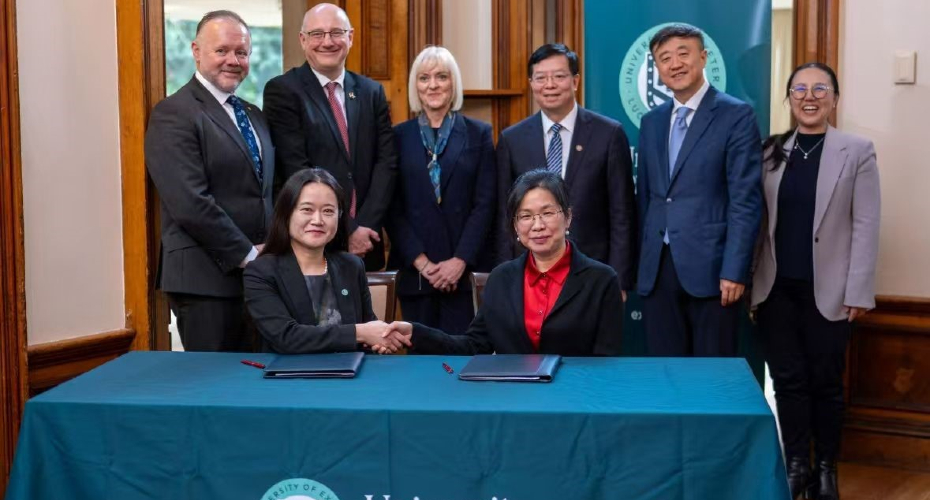Launch of the Tsinghua-Exeter Institute of Global Humanities

The University of Exeter and Tsinghua University have launched a new Institute for Global Humanities, inaugurated by signing a Memorandum of Understanding between the two partners.
The MOU establishing the new Institute was signed by Professor Li Li, Associate Pro Vice-Chancellor (Global) in the Faculty of Humanities, Arts and Social Sciences, and Professor Wu Xia, Dean of the Department of Foreign Languages and Literatures at Tsinghua, who also co-lead the Institute.
The signing was witnessed by President and Vice-Chancellor Professor Lisa Roberts, and Professor Qiu Yong, Chairman of Tsinghua University Council, during a commemorative event held on the Streatham Campus.
The Institute for Global Humanities opens a new chapter in the Exeter-Tsinghua strategic partnership, deepening opportunity for collaboration in arts and humanities research. The Institute will offer a supportive and inclusive cross-disciplinary research environment for scholars working in humanities subjects, including but not limited to philosophy, history and languages, and connected research with other disciplines. It will facilitate annual conferences and regular research events, education partnership and other activities.
Professor Roberts said: “This is an incredibly exciting moment. The MoU we are signing outlines the common objectives that both Tsinghua and Exeter have for this new Institute, and it is the first important step in establishing a broad framework for how we will use the Institute, and how we will work together, for the benefit of research at both institutions. It also demonstrates our optimism for the future of this treasured partnership, and the strength of the friendship between us.
“Among other things, it will foster a supportive and inclusive research environment, in which academic colleagues can work across disciplines within humanities to generate new research ideas, make new discoveries, and develop innovative, ethical and sustainable approaches to advance humanities research.”
Professor Yong also remarked that the move underscored Tsinghua’s dedication to fostering multidisciplinary, cross-border collaboration to address pressing global issues.
The Institute builds on the already substantive cooperation between Exeter and Tsinghua across arts and humanities. It will provide a platform for the partners to develop innovative, ethical and sustainable approaches to advance humanities research by exchanging experience and expertise through academic and student visits, among a range of other collaborative endeavours.
The signing event was joined by senior leaders at Exeter including Professor Richard Follett, Deputy Vice-Chancellor, Global Engagement; Professor Gareth Stansfield, Pro Vice-Chancellor and Executive Dean of the Faculty of Humanities, Arts and Social Sciences; and other invited guests from across the HASS Faculty and Global Partnerships and Global Exeter teams.
The Tsinghua delegation included Professor Yang Bin (Vice President); Professor WU Xia (Dean, Department of Foreign Languages and Literatures); Professor ZHOU Qing An (Dean, School of Journalism and Communication); Ms. XIAO Qian (Dean, Office of International Affairs); Professor JIANG Jingkui (Director, Institute for International and Area Studies); Professor GAO Yang (Associate Dean of Department of Foreign Languages and Literatures); Ms. LIU Nannan (Associate Dean, Office of International Affairs); Professor TANG Hao (Professor of Philosophy, Department of Philosophy, School of Humanities) as well as representatives of Tsinghua’s Office of International Affairs and media teams.
Prof Li Li, Associate Pro Vice-Chancellor (Global) in HASS, said: “This institute is a milestone in our commitment to advancing international collaboration in the humanities, a field whose value is continually underscored in our rapidly evolving interconnected world. It is a true privilege to work with Professor Wu Xia on this initiative and I am confident that this collaboration will yield exceptional academic contributions, promote cultural understanding and strengthen our mutual goals.”



